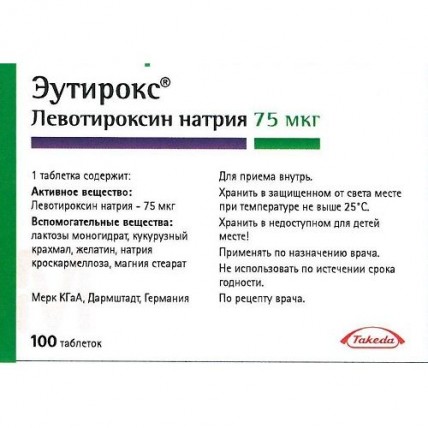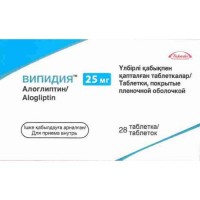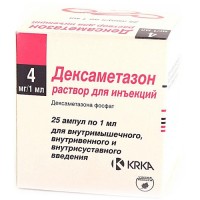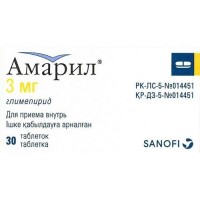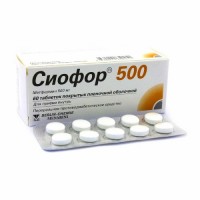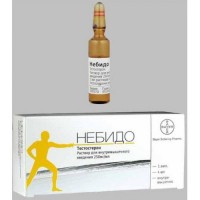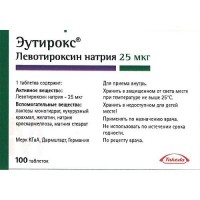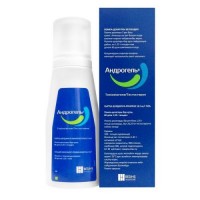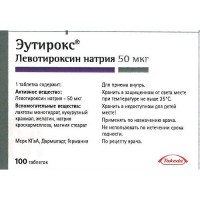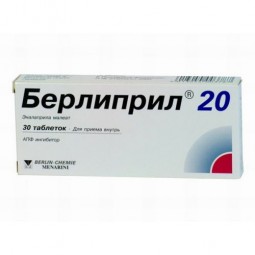Eutiroks 75 mg (100 tablets)
- $12.10
The instruction for medical use
of Eutiroks® medicine
the Trade name
of Eutiroks®
the International unlicensed
name Levotiroksin of sodium
the Dosage form
mkg Tablets 25, 50, 75, 100, 125 and 150
One tablet contains Structure:
active agent – sodium left thyroxine * 0.026, 0.053, 0.079, 0.105, 0.131 and 0.158 mg,
excipients: lactoses monohydrate, starch corn, gelatin, croscarmellose sodium, magnesium stearate,
* - for stability add 5% excess of left thyroxine of sodium
the Description
the White, round tablets flat from two parties, with slanted edges. On both parties of a tablet is dividing risk, on one party of a tablet - an engraving I eat 25, I eat 50, I eat 75, I eat 100, I eat 125, I eat 150 (for each dosage).
Pharmacotherapeutic group
Drugs for treatment of diseases of a thyroid gland. Hormones of a thyroid gland. Sodium left thyroxine.
The ATX H03AA01 code
the Pharmacological
Pharmacokinetics At properties intake left thyroxine is soaked up mainly in an upper part of a small intestine. Depending on galenovy composition, about 80% of drug are soaked up. tmax makes about 5-6 hours.
The beginning of effect of drug is observed in 3-5 days after intake. Left thyroxine for 99.97% contacts special transport proteins. This bond is not covalent therefore there is constant and very fast exchange of the hormones connected with proteins of plasma, and fractions of free hormone. Thanks to the protein-binding, left thyroxine is not exposed to either a hemodialysis, or hemoperfusion. Elimination half-life of left thyroxine makes 7 days. In a hyperthyroidism the elimination half-life is reduced to 3-4 days, and at a hypothyroidism increases up to 9-10 days. The volume of distribution is about 10-12 l. The liver contains 1/3 all ekstratireoidny left thyroxines which is subject to fast exchange with left thyroxine in serum. Thyroid hormones are metabolized mainly in a liver, kidneys, a brain and muscles. Metabolites are removed with urine and a stake. The general metabolic clearance of left thyroxine is about 1.2 liters of plasma a day.
A pharmacodynamics
Synthetic left thyroxine which contains in the drug Eutiroks® is identical on the action to the natural main hormone produced by a thyroid gland. It will be transformed to T3 in peripheral bodies and like endogenous hormone makes specific impact on T3 receptors. The organism is not capable to distinguish endogenous and exogenous left thyroxine.
Indications
of Эутирокс® 25 - 150 mkg:
− treatment of a benign euthyroid craw
− prevention of a recurrence after surgical treatment of an euthyroid craw depending on the postoperative hormonal status
− replacement therapy at a hypothyroidism
− suppressive therapy of cancer of thyroid gland
of Эутирокс® 25 - 100 mkg:
− the accompanying therapy at treatment of a hyperthyroidism anti-thyroid
drugs Eutiroks® 100/150mkg:
− use as diagnostic means at test of thyroid suppression
the Route of administration and doses
Daily doses can be accepted in one step.
Intake: one daily dose in the morning on an empty stomach, in 30 minutes prior to a breakfast, it is preferable with a small amount of water (half-glass of water).
Babies a daily dose are given in one step in 30 minutes prior to the first morning feeding. Tablets dissolve in water, the turned-out suspension is accepted with a number of water. Suspension has to be freshly cooked for each reception.
Tablets with various content of left thyroxine of sodium – from 25 to 150 mkg are available to treatment of patients on the basis of their individual requirements. Therefore usually patients need to take only one pill a day.
Recommendations about a dosage are given in tables below.
The daily dose is defined individually depending on laboratory tests and clinical examination. As at most of patients the increased concentration of T4 and FT4 is observed, basal concentration of thyroid stimulating hormone (TSH) in serum provides more reliable basis for definition of a course of treatment.
Therapy by thyroid hormones should be begun with a low dose, gradually increasing it each 2-4 weeks before achievement of a full replaceable dose.
For newborns and children with a congenital hypothyroidism when fast replacement therapy is important, the initial recommended dose makes 10-15 mkg/kg of body weight a day within the first 3 months. Then it is necessary to adjust a dose on an individual basis depending on clinical results, the TSH level and thyroid hormones.
To elderly patients, patients with coronary heart disease, and to patients with heavy or long ago the existing hypothyroidism it is necessary to begin treatment with low doses (for example, 12.5 mkg/days) and their slow increase through long intervals (for example, gradual increase in a dose of times in two weeks on 12.5 mkg/days) with frequent monitoring of thyroid hormones. Therefore it is possible to such patients to consider purpose of the smaller dose which is not providing full replacement therapy which will not lead to full correction of the TSH level.
Experience of use of drug shows that lower dosage is sufficient for patients with a low weight and patients with a big nodal craw.
Indications
the Recommended dose
(mkg/day sodium left thyroxine)
Treatment of a benign euthyroid craw
75 - 200
Prevention of a recurrence
after surgical treatment of an euthyroid craw
75 ‑ 200
Replacement therapy
at a gipoterioza at adults
− an initial dose
− a maintenance dose
Adult
25 ‑ 50,100 ‑ 200
Children
12.5 ‑
50,100 ‑ 150 mkg / м2поверхности bodies
the Accompanying therapy during treatment of a hyperthyroidism anti-thyroid
drugs 50 - 100
Supressivnaya therapy of cancer of thyroid gland
150 - 300
Use in the diagnostic purposes at test of thyroid suppression
In 4 weeks
prior to
the test
In 3 weeks
prior to
the test
In 2 weeks
prior to
the test
In 1 week
prior to
test 75 75 150 - 200 150-200
the Recommended thyroxine doses for treatment of a congenital hypothyroidism
Age
the Daily
dose of left thyroxine of sodium
(mkg)
a sodium left thyroxine Dose per the body weight (mkg/kg)
of 0-6
months 25-50 10-15 6-12 months 50-75 6-8 1-5 years 75-100 5-6 6-12 years
100-150 4-5
& gt, 12 years
100-200 2-3
in case of replacement maintenance therapy at a hypothyroidism and also after strumectomy or thyroidectomy and at prevention of a recurrence after removal of an euthyroid craw take the drug, as a rule, during all life. The accompanying treatment of a hyperthyroidism after achievement of the euthyroid status is shown for the term during which anti-thyroid drug is used.
In a benign euthyroid craw duration of treatment is from 6 months to 2 years. If treatment during the specified period appears insufficiently, it is necessary to consider the possibility of surgical intervention or treatment of a craw radioiodine.
Side effects
− cardiac arrhythmia (for example, atrial fibrillation and extrasystoles), tachycardia, heartbeat, stenocardia
− headache
− muscle weakness and spasms
− hyperaemia, heat
− vomiting, diarrhea
− disturbance of a menstrual cycle
− intracranial hypertensia, tremor, concern, sleep disorder
− excessive sweating
− decrease in body weight
− reactions of hypersensitivity (Quincke's disease, etc.)
Contraindications
− hypersensitivity to active agent or any excipient
− uncured insufficiency of adrenal glands
− uncured hypophysial insufficiency
− an uncured thyrotoxicosis
− use during pregnancy in a combination with antitireodny means
− it is not necessary to begin the Eutiroks® drug treatment in an acute myocardial infarction, acute myocarditis and an acute pancarditis
− drug contains lactose therefore its use is not recommended to patients with the rare hereditary diseases connected with intolerance of a galactose, deficiency of Lapp enzyme of lactase or glyukozo-galaktozny malabsorption.
Medicinal interactions
Antidiabetic means
Levotiroksin can reduce efficiency of antidiabetic means. Therefore it is recommended to check often glucose level in blood in an initiation of treatment thyroid hormones. If necessary it is necessary to carry out dose adjustment of antidiabetic means.
Action of anticoagulating therapy as it forces out anticoagulants from communication with proteins of plasma that can increase risk of developing bleeding, for example, of hemorrhage in central nervous system or gastrointestinal bleeding, especially at elderly patients can strengthen derivatives of Levotiroksin coumarin. Therefore regular monitoring of parameters of coagulation at the beginning is necessary and during the accompanying therapy. If necessary the dose of anticoagulants should be corrected.
Protease inhibitors
protease Inhibitors, such as ritonavir, indinavir, lopinavir, can influence efficiency of left thyroxine. It is recommended to carry out careful monitoring of level of thyroid hormones. If necessary it is necessary to correct a left thyroxine dose.
Phenytoinum
Phenytoinum can affect efficiency of left thyroxine by its replacement from communication with proteins of plasma that can lead to increase in level of free T4 and T3. On the other hand, Phenytoinum increases intensity of metabolism of left thyroxine in a liver. It is recommended to carry out careful monitoring of level of thyroid hormones.
Colestyraminum, kolestipol
Intake of ion-exchange resins, such as Colestyraminum and kolestipol, inhibits sodium left thyroxine absorption. Therefore left thyroxine of sodium should be accepted in 4-5 hours prior to intake of the specified drugs.
Aluminum-bearing drugs, ferriferous drugs, calcium carbonate
Aluminum-bearing drugs (antacids, sukralfat) in the corresponding literature are described as potentially reducing efficiency of left thyroxine. It is necessary to accept the drugs containing left thyroxine not less than in 2 hours prior to intake of aluminum-bearing drugs. Same treats ferriferous drugs and calcium carbonate.
Salicylates, dikumarol, furosemide, Clofibratum
Salicylates, dikumarol, furosemide in high doses (250 mg), Clofibratum and other drugs can force out sodium left thyroxine from communication with proteins of plasma that leads to increase in level of fraction of free T4.
Sevelamer
Sevelamer can reduce left thyroxine absorption. Therefore it is recommended to carry out monitoring regarding change of function of a thyroid gland at patients at the beginning and at the end of the accompanying therapy. If necessary it is necessary to correct a left thyroxine dose.
Tyrosinekinase inhibitors
tyrosinekinase Inhibitors, such as imatinib, sunitinib, can reduce efficiency of left thyroxine. Therefore it is recommended to carry out monitoring regarding change of function of a thyroid gland at patients at the beginning and at the end of the accompanying therapy. If necessary it is necessary to correct a left thyroxine dose.
Propylthiouracil, glucocorticoids, beta sympatholytics, Amiodaronum and iodinated contrast agents
the Specified substances inhibit peripheral transformation of T4 into T3.
In view of the high content of iodine Amiodaronum can initiate both a hyperthyroidism, and a hypothyroidism. Special attention should be paid to a nodal craw with the possible not recognizable functional autonomy.
Sertraline, chloroquine/proguanil
These substances reduce efficiency of left thyroxine and increase the TSH level in serum.
The drugs possessing enzyme - the inducing action
the Drugs possessing enzyme - the inducing action, such as barbiturates or carbamazepine, can increase hepatic clearance of left thyroxine.
Estrogen
At the women using estrogensoderzhashchy contraceptives or at the women in a postmenopause receiving replacement hormonal therapy the need for left thyroxine can increase.
The Soyesoderzhashchy
Use of Soyesoderzhashchy Products products can promote decrease in intestinal absorption of left thyroxine. Therefore dose adjustment of Eutiroksa®, especially at the beginning or after the termination of the use of the products containing soy can be required.
Special instructions
Prior to replacement therapy by thyroid hormones or before test of thyroid suppression need to be excluded or carried out treatment of the following diseases or morbid conditions: coronary insufficiency, stenocardia, arteriosclerosis, hypertensia, hypophysial insufficiency and insufficiency of adrenal glands. Also prior to therapy it is necessary to exclude or carry out by hormones of a thyroid gland treatment of functional autonomy of a thyroid gland.
It is necessary to exclude possibility even of the insignificant medicinal caused hypothyroidism at patients with coronary insufficiency, heart failure or tachyarrhythmias. Therefore in these cases the regular monitoring of level of thyroid hormones is necessary.
Prior to performing replacement therapy it is necessary to define the cause of a secondary hypothyroidism as insufficiency of thyroid stimulating hormone at a secondary hypothyroidism seldom meets separately. At confirmation of the combined pathology the Eutiroks® drug treatment needs to be begun only after compensation of adrenal insufficiency.
At suspicion on development of functional autonomy of a thyroid gland prior to therapy the implementation of the stimulation test about thyrotropin-rileasing is recommended by hormone (TRH test) or a suppressive stsintigrafiya.
Women in a postmenopause with a hypothyroidism and the increased risk of developing osteoporosis should avoid increase in physiological concentration of left thyroxine in blood serum. In this case careful monitoring of function of a thyroid gland is recommended.
It is not recommended to accept left thyroxine at hyper thyroid states. An exception is the accompanying therapy at treatment of a hyperthyroidism anti-thyroid drugs.
Thyroid hormones are not intended for weight reduction. Physiological doses do not lead to weight reduction at euthyroid patients. Suprafiziologichesky doses can cause serious or even life-threatening undesirable effects (see the section overdose).
From the moment of the beginning of therapy, left thyroxine in case of switching from one drug to another recommends to correct a dose depending on the clinical response of the patient to therapy and results of laboratory inspection.
Information for the patients having diabetes, and the patients undergoing anticoagulating therapy is provided in the section medicinal interactions.
Pregnancy and a lactation
during pregnancy and especially in the period of a lactation the intake of left thyroxine should be continued. During pregnancy even increase in a dose can be required. There are no data on emergence of teratogenic and fetotoksichny effects at administration of drug in the recommended therapeutic doses. Administration of drug during pregnancy in excessively high doses can have negative effect on a fruit and post-natal development.
Use at pregnancy of drug in a combination with anti-thyroid means is contraindicated as intake of left thyroxine of sodium can demand increase in doses of anti-thyroid means. As anti-thyroid means, unlike sodium left thyroxine, can get through a placenta, at a fruit the hypothyroidism can develop.
During pregnancy it is not recommended to carry out diagnostic test of thyroid suppression as use of radioactive materials to contraindicated pregnant women.
Left thyroxine cosecretes in breast milk at a lactation, but concentration of the drug Eutiroks® at reception of the recommended therapeutic doses are insufficient to cause development of a hyperthyroidism or suppression of secretion of TSH in the baby.
Features of influence of medicine on ability to run the vehicle or potentially dangerous mechanisms.
Researches of influence of drug on ability to run vehicles and mechanisms were not conducted. Nevertheless, as left thyroxine of sodium is identical to natural thyroid hormone, no influence on ability to run vehicles and mechanisms is expected.
The overdose
At overdose of drug is observed significant increase in metabolic rate.
Clinical signs of a hyperthyroidism can arise in case of overdose or exceeding an individual threshold of tolerance of left thyroxine of sodium, especially if at the beginning of therapy the dose increases too quickly. At emergence of such symptoms it is necessary to reduce a daily dose or to stop administration of drug for several days. After disappearance of side effects the treatment should be resumed with care.
Symptoms: heartbeat increase (tachycardia), concern, excitement or inadvertent movements (hyperkinesias). Cases of a sudden stop of warm activity at patients who accepted excessively high doses of left thyroxine of sodium for many years were registered.
At the patients predisposed to disorders separate cases of development of spasms when exceeding an individual threshold of shipping were noted.
Treatment: the increased T3 level is the overdose indicator. Depending on extent of overdose it is recommended to suspend the Eutiroks® drug treatment and to perform laboratory examination. Beta blockers can be appointed. At reception of extremely high doses the plasma exchange can be appointed.
A form of release and packing
On 25 tablets in blister strip packaging from a film of polyvinylchloride and aluminum foil. On 4 blister strip packagings together with the instruction for medical use in the state and Russian languages put in a cardboard box.
To Store storage conditions in the place protected from light, at a temperature not above 25 °C.
To store out of children's reach!
3 years
not to apply a period of storage after expiry date.
Prescription status
According to the prescription
the Producer
Merk of KGaA, Germany
the Name and the country of the owner of the registration certificate
of Merck of KGaA, Germany
the Name and the country of the organization packer
of Merck of KGaA, Germany
the Name and the country of the organization - the releasing quality control
of Merck of KGaA, Germany
the Address of the organization accepting in the territory of the Republic of Kazakhstan claims from consumers on quality of products (goods)
Representative office Takeda Osteuropa Holding GmbH (Austria) in
Kazakhstan Almaty, Begalin St. 136 and
Phone number (727) 2444004
Fax number (727) 2444005
To Develop the e-mail address of DSO-KZ@takeda.com
of Eutiroks® medicine
the Trade name
of Eutiroks®
the International unlicensed
name Levotiroksin of sodium
the Dosage form
mkg Tablets 25, 50, 75, 100, 125 and 150
One tablet contains Structure:
active agent – sodium left thyroxine * 0.026, 0.053, 0.079, 0.105, 0.131 and 0.158 mg,
excipients: lactoses monohydrate, starch corn, gelatin, croscarmellose sodium, magnesium stearate,
* - for stability add 5% excess of left thyroxine of sodium
the Description
the White, round tablets flat from two parties, with slanted edges. On both parties of a tablet is dividing risk, on one party of a tablet - an engraving I eat 25, I eat 50, I eat 75, I eat 100, I eat 125, I eat 150 (for each dosage).
Pharmacotherapeutic group
Drugs for treatment of diseases of a thyroid gland. Hormones of a thyroid gland. Sodium left thyroxine.
The ATX H03AA01 code
the Pharmacological
Pharmacokinetics At properties intake left thyroxine is soaked up mainly in an upper part of a small intestine. Depending on galenovy composition, about 80% of drug are soaked up. tmax makes about 5-6 hours.
The beginning of effect of drug is observed in 3-5 days after intake. Left thyroxine for 99.97% contacts special transport proteins. This bond is not covalent therefore there is constant and very fast exchange of the hormones connected with proteins of plasma, and fractions of free hormone. Thanks to the protein-binding, left thyroxine is not exposed to either a hemodialysis, or hemoperfusion. Elimination half-life of left thyroxine makes 7 days. In a hyperthyroidism the elimination half-life is reduced to 3-4 days, and at a hypothyroidism increases up to 9-10 days. The volume of distribution is about 10-12 l. The liver contains 1/3 all ekstratireoidny left thyroxines which is subject to fast exchange with left thyroxine in serum. Thyroid hormones are metabolized mainly in a liver, kidneys, a brain and muscles. Metabolites are removed with urine and a stake. The general metabolic clearance of left thyroxine is about 1.2 liters of plasma a day.
A pharmacodynamics
Synthetic left thyroxine which contains in the drug Eutiroks® is identical on the action to the natural main hormone produced by a thyroid gland. It will be transformed to T3 in peripheral bodies and like endogenous hormone makes specific impact on T3 receptors. The organism is not capable to distinguish endogenous and exogenous left thyroxine.
Indications
of Эутирокс® 25 - 150 mkg:
− treatment of a benign euthyroid craw
− prevention of a recurrence after surgical treatment of an euthyroid craw depending on the postoperative hormonal status
− replacement therapy at a hypothyroidism
− suppressive therapy of cancer of thyroid gland
of Эутирокс® 25 - 100 mkg:
− the accompanying therapy at treatment of a hyperthyroidism anti-thyroid
drugs Eutiroks® 100/150mkg:
− use as diagnostic means at test of thyroid suppression
the Route of administration and doses
Daily doses can be accepted in one step.
Intake: one daily dose in the morning on an empty stomach, in 30 minutes prior to a breakfast, it is preferable with a small amount of water (half-glass of water).
Babies a daily dose are given in one step in 30 minutes prior to the first morning feeding. Tablets dissolve in water, the turned-out suspension is accepted with a number of water. Suspension has to be freshly cooked for each reception.
Tablets with various content of left thyroxine of sodium – from 25 to 150 mkg are available to treatment of patients on the basis of their individual requirements. Therefore usually patients need to take only one pill a day.
Recommendations about a dosage are given in tables below.
The daily dose is defined individually depending on laboratory tests and clinical examination. As at most of patients the increased concentration of T4 and FT4 is observed, basal concentration of thyroid stimulating hormone (TSH) in serum provides more reliable basis for definition of a course of treatment.
Therapy by thyroid hormones should be begun with a low dose, gradually increasing it each 2-4 weeks before achievement of a full replaceable dose.
For newborns and children with a congenital hypothyroidism when fast replacement therapy is important, the initial recommended dose makes 10-15 mkg/kg of body weight a day within the first 3 months. Then it is necessary to adjust a dose on an individual basis depending on clinical results, the TSH level and thyroid hormones.
To elderly patients, patients with coronary heart disease, and to patients with heavy or long ago the existing hypothyroidism it is necessary to begin treatment with low doses (for example, 12.5 mkg/days) and their slow increase through long intervals (for example, gradual increase in a dose of times in two weeks on 12.5 mkg/days) with frequent monitoring of thyroid hormones. Therefore it is possible to such patients to consider purpose of the smaller dose which is not providing full replacement therapy which will not lead to full correction of the TSH level.
Experience of use of drug shows that lower dosage is sufficient for patients with a low weight and patients with a big nodal craw.
Indications
the Recommended dose
(mkg/day sodium left thyroxine)
Treatment of a benign euthyroid craw
75 - 200
Prevention of a recurrence
after surgical treatment of an euthyroid craw
75 ‑ 200
Replacement therapy
at a gipoterioza at adults
− an initial dose
− a maintenance dose
Adult
25 ‑ 50,100 ‑ 200
Children
12.5 ‑
50,100 ‑ 150 mkg / м2поверхности bodies
the Accompanying therapy during treatment of a hyperthyroidism anti-thyroid
drugs 50 - 100
Supressivnaya therapy of cancer of thyroid gland
150 - 300
Use in the diagnostic purposes at test of thyroid suppression
In 4 weeks
prior to
the test
In 3 weeks
prior to
the test
In 2 weeks
prior to
the test
In 1 week
prior to
test 75 75 150 - 200 150-200
the Recommended thyroxine doses for treatment of a congenital hypothyroidism
Age
the Daily
dose of left thyroxine of sodium
(mkg)
a sodium left thyroxine Dose per the body weight (mkg/kg)
of 0-6
months 25-50 10-15 6-12 months 50-75 6-8 1-5 years 75-100 5-6 6-12 years
100-150 4-5
& gt, 12 years
100-200 2-3
in case of replacement maintenance therapy at a hypothyroidism and also after strumectomy or thyroidectomy and at prevention of a recurrence after removal of an euthyroid craw take the drug, as a rule, during all life. The accompanying treatment of a hyperthyroidism after achievement of the euthyroid status is shown for the term during which anti-thyroid drug is used.
In a benign euthyroid craw duration of treatment is from 6 months to 2 years. If treatment during the specified period appears insufficiently, it is necessary to consider the possibility of surgical intervention or treatment of a craw radioiodine.
Side effects
− cardiac arrhythmia (for example, atrial fibrillation and extrasystoles), tachycardia, heartbeat, stenocardia
− headache
− muscle weakness and spasms
− hyperaemia, heat
− vomiting, diarrhea
− disturbance of a menstrual cycle
− intracranial hypertensia, tremor, concern, sleep disorder
− excessive sweating
− decrease in body weight
− reactions of hypersensitivity (Quincke's disease, etc.)
Contraindications
− hypersensitivity to active agent or any excipient
− uncured insufficiency of adrenal glands
− uncured hypophysial insufficiency
− an uncured thyrotoxicosis
− use during pregnancy in a combination with antitireodny means
− it is not necessary to begin the Eutiroks® drug treatment in an acute myocardial infarction, acute myocarditis and an acute pancarditis
− drug contains lactose therefore its use is not recommended to patients with the rare hereditary diseases connected with intolerance of a galactose, deficiency of Lapp enzyme of lactase or glyukozo-galaktozny malabsorption.
Medicinal interactions
Antidiabetic means
Levotiroksin can reduce efficiency of antidiabetic means. Therefore it is recommended to check often glucose level in blood in an initiation of treatment thyroid hormones. If necessary it is necessary to carry out dose adjustment of antidiabetic means.
Action of anticoagulating therapy as it forces out anticoagulants from communication with proteins of plasma that can increase risk of developing bleeding, for example, of hemorrhage in central nervous system or gastrointestinal bleeding, especially at elderly patients can strengthen derivatives of Levotiroksin coumarin. Therefore regular monitoring of parameters of coagulation at the beginning is necessary and during the accompanying therapy. If necessary the dose of anticoagulants should be corrected.
Protease inhibitors
protease Inhibitors, such as ritonavir, indinavir, lopinavir, can influence efficiency of left thyroxine. It is recommended to carry out careful monitoring of level of thyroid hormones. If necessary it is necessary to correct a left thyroxine dose.
Phenytoinum
Phenytoinum can affect efficiency of left thyroxine by its replacement from communication with proteins of plasma that can lead to increase in level of free T4 and T3. On the other hand, Phenytoinum increases intensity of metabolism of left thyroxine in a liver. It is recommended to carry out careful monitoring of level of thyroid hormones.
Colestyraminum, kolestipol
Intake of ion-exchange resins, such as Colestyraminum and kolestipol, inhibits sodium left thyroxine absorption. Therefore left thyroxine of sodium should be accepted in 4-5 hours prior to intake of the specified drugs.
Aluminum-bearing drugs, ferriferous drugs, calcium carbonate
Aluminum-bearing drugs (antacids, sukralfat) in the corresponding literature are described as potentially reducing efficiency of left thyroxine. It is necessary to accept the drugs containing left thyroxine not less than in 2 hours prior to intake of aluminum-bearing drugs. Same treats ferriferous drugs and calcium carbonate.
Salicylates, dikumarol, furosemide, Clofibratum
Salicylates, dikumarol, furosemide in high doses (250 mg), Clofibratum and other drugs can force out sodium left thyroxine from communication with proteins of plasma that leads to increase in level of fraction of free T4.
Sevelamer
Sevelamer can reduce left thyroxine absorption. Therefore it is recommended to carry out monitoring regarding change of function of a thyroid gland at patients at the beginning and at the end of the accompanying therapy. If necessary it is necessary to correct a left thyroxine dose.
Tyrosinekinase inhibitors
tyrosinekinase Inhibitors, such as imatinib, sunitinib, can reduce efficiency of left thyroxine. Therefore it is recommended to carry out monitoring regarding change of function of a thyroid gland at patients at the beginning and at the end of the accompanying therapy. If necessary it is necessary to correct a left thyroxine dose.
Propylthiouracil, glucocorticoids, beta sympatholytics, Amiodaronum and iodinated contrast agents
the Specified substances inhibit peripheral transformation of T4 into T3.
In view of the high content of iodine Amiodaronum can initiate both a hyperthyroidism, and a hypothyroidism. Special attention should be paid to a nodal craw with the possible not recognizable functional autonomy.
Sertraline, chloroquine/proguanil
These substances reduce efficiency of left thyroxine and increase the TSH level in serum.
The drugs possessing enzyme - the inducing action
the Drugs possessing enzyme - the inducing action, such as barbiturates or carbamazepine, can increase hepatic clearance of left thyroxine.
Estrogen
At the women using estrogensoderzhashchy contraceptives or at the women in a postmenopause receiving replacement hormonal therapy the need for left thyroxine can increase.
The Soyesoderzhashchy
Use of Soyesoderzhashchy Products products can promote decrease in intestinal absorption of left thyroxine. Therefore dose adjustment of Eutiroksa®, especially at the beginning or after the termination of the use of the products containing soy can be required.
Special instructions
Prior to replacement therapy by thyroid hormones or before test of thyroid suppression need to be excluded or carried out treatment of the following diseases or morbid conditions: coronary insufficiency, stenocardia, arteriosclerosis, hypertensia, hypophysial insufficiency and insufficiency of adrenal glands. Also prior to therapy it is necessary to exclude or carry out by hormones of a thyroid gland treatment of functional autonomy of a thyroid gland.
It is necessary to exclude possibility even of the insignificant medicinal caused hypothyroidism at patients with coronary insufficiency, heart failure or tachyarrhythmias. Therefore in these cases the regular monitoring of level of thyroid hormones is necessary.
Prior to performing replacement therapy it is necessary to define the cause of a secondary hypothyroidism as insufficiency of thyroid stimulating hormone at a secondary hypothyroidism seldom meets separately. At confirmation of the combined pathology the Eutiroks® drug treatment needs to be begun only after compensation of adrenal insufficiency.
At suspicion on development of functional autonomy of a thyroid gland prior to therapy the implementation of the stimulation test about thyrotropin-rileasing is recommended by hormone (TRH test) or a suppressive stsintigrafiya.
Women in a postmenopause with a hypothyroidism and the increased risk of developing osteoporosis should avoid increase in physiological concentration of left thyroxine in blood serum. In this case careful monitoring of function of a thyroid gland is recommended.
It is not recommended to accept left thyroxine at hyper thyroid states. An exception is the accompanying therapy at treatment of a hyperthyroidism anti-thyroid drugs.
Thyroid hormones are not intended for weight reduction. Physiological doses do not lead to weight reduction at euthyroid patients. Suprafiziologichesky doses can cause serious or even life-threatening undesirable effects (see the section overdose).
From the moment of the beginning of therapy, left thyroxine in case of switching from one drug to another recommends to correct a dose depending on the clinical response of the patient to therapy and results of laboratory inspection.
Information for the patients having diabetes, and the patients undergoing anticoagulating therapy is provided in the section medicinal interactions.
Pregnancy and a lactation
during pregnancy and especially in the period of a lactation the intake of left thyroxine should be continued. During pregnancy even increase in a dose can be required. There are no data on emergence of teratogenic and fetotoksichny effects at administration of drug in the recommended therapeutic doses. Administration of drug during pregnancy in excessively high doses can have negative effect on a fruit and post-natal development.
Use at pregnancy of drug in a combination with anti-thyroid means is contraindicated as intake of left thyroxine of sodium can demand increase in doses of anti-thyroid means. As anti-thyroid means, unlike sodium left thyroxine, can get through a placenta, at a fruit the hypothyroidism can develop.
During pregnancy it is not recommended to carry out diagnostic test of thyroid suppression as use of radioactive materials to contraindicated pregnant women.
Left thyroxine cosecretes in breast milk at a lactation, but concentration of the drug Eutiroks® at reception of the recommended therapeutic doses are insufficient to cause development of a hyperthyroidism or suppression of secretion of TSH in the baby.
Features of influence of medicine on ability to run the vehicle or potentially dangerous mechanisms.
Researches of influence of drug on ability to run vehicles and mechanisms were not conducted. Nevertheless, as left thyroxine of sodium is identical to natural thyroid hormone, no influence on ability to run vehicles and mechanisms is expected.
The overdose
At overdose of drug is observed significant increase in metabolic rate.
Clinical signs of a hyperthyroidism can arise in case of overdose or exceeding an individual threshold of tolerance of left thyroxine of sodium, especially if at the beginning of therapy the dose increases too quickly. At emergence of such symptoms it is necessary to reduce a daily dose or to stop administration of drug for several days. After disappearance of side effects the treatment should be resumed with care.
Symptoms: heartbeat increase (tachycardia), concern, excitement or inadvertent movements (hyperkinesias). Cases of a sudden stop of warm activity at patients who accepted excessively high doses of left thyroxine of sodium for many years were registered.
At the patients predisposed to disorders separate cases of development of spasms when exceeding an individual threshold of shipping were noted.
Treatment: the increased T3 level is the overdose indicator. Depending on extent of overdose it is recommended to suspend the Eutiroks® drug treatment and to perform laboratory examination. Beta blockers can be appointed. At reception of extremely high doses the plasma exchange can be appointed.
A form of release and packing
On 25 tablets in blister strip packaging from a film of polyvinylchloride and aluminum foil. On 4 blister strip packagings together with the instruction for medical use in the state and Russian languages put in a cardboard box.
To Store storage conditions in the place protected from light, at a temperature not above 25 °C.
To store out of children's reach!
3 years
not to apply a period of storage after expiry date.
Prescription status
According to the prescription
the Producer
Merk of KGaA, Germany
the Name and the country of the owner of the registration certificate
of Merck of KGaA, Germany
the Name and the country of the organization packer
of Merck of KGaA, Germany
the Name and the country of the organization - the releasing quality control
of Merck of KGaA, Germany
the Address of the organization accepting in the territory of the Republic of Kazakhstan claims from consumers on quality of products (goods)
Representative office Takeda Osteuropa Holding GmbH (Austria) in
Kazakhstan Almaty, Begalin St. 136 and
Phone number (727) 2444004
Fax number (727) 2444005
To Develop the e-mail address of DSO-KZ@takeda.com
